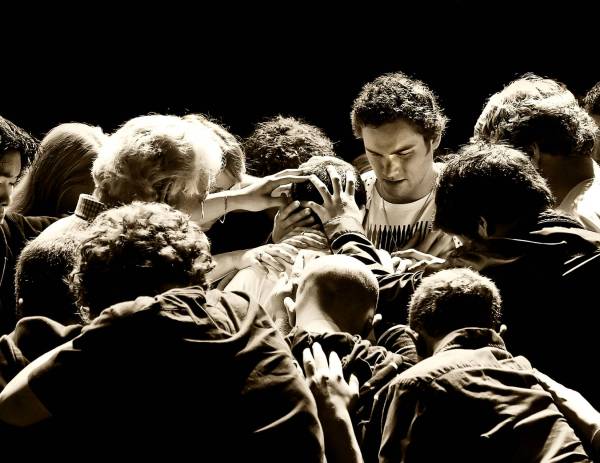Prayer, Science, and the Existence of God
by Trent Horn
Filed under Belief, Science, The Existence of God
Can science find God? If God is defined as a being (or perhaps “the ground of being”) that is neither composed of matter nor confined to a spatial location, then the answer seems to be no. After all, science is limited to explaining the natural, physical world. If God exists beyond that world and is not composed of anything found within it, then he seems to be out of the reach of scientific inquiry.
But even if science can’t “find” God in the same way I can find my car in a parking lot, maybe it can indirectly find him. After all, if God affects the physical world, then couldn’t scientific experiments detect those effects and then infer from them that God exists?
One common interaction between God and the universe that believers and nonbelievers think can be tested is prayer—specifically, intercessory prayer for other people. This testing usually takes the form of “prayer studies” that test whether praying for the sick results in more positive health outcomes.
However, I contend that scientific study of the efficacy of prayer can neither prove nor disprove the existence of God. The reason is summarized in the following three “problems” inherent to any such study.
The Problem of the Control Group
In any experiment, the control group must be observed without the variable that’s being tested for. In this case, that would involve a group of people who are not receiving intercessory healing prayers. Now, it’s easy to create two groups of sick people and then tell a group of volunteers to pray for one of the groups. Meanwhile, researchers observe the other group, of which the volunteers are ignorant, to see how it fares when not prayed for.
But the other group still wouldn’t be a true control group, because there is no way to isolate it from receiving any form of intercessory prayer. What if the friends and family of the people in this group are praying for them? What if a holy woman in rural Nepal prays that “everyone be healed” or that those “who have no one to pray for them” be healed?
Why should we expect God to answer only the prayers of the volunteers in a prayer study and not prayers made by anyone else? This brings us to problem number two with prayer studies.
The Problem of the Test Subject
Testing the effects of intercessory prayer isn’t the same as testing an inanimate force like gravity, because God isn’t a force that is automatically activated when enough prayers are uttered. God is much more like a person than he is a force, and so he might choose to honor or not honor certain requests made through prayer. In fact, it’s been said that God always answers our prayers—it’s just that sometimes the answer is “no.”
Now, science is used to testing the reactions of people and not just forces (psychologists and sociologists do this all the time). But those experiments must be blind or even double blind. The person being tested can’t know that scientists are testing him. But if God is omniscient, then he always knows when he’s being tested. Any experiment involving him can’t be blind and so it probably can’t be scientific.
Here’s an example to explain how omniscience messes up any kind of prayer study.
Suppose we wanted to determine how much time the President spends reviewing different kinds of petitions made to whitehouse.gov (I know the President probably doesn’t read these himself, but let’s imagine he did). Our experiment wouldn’t work if we told the President that we were monitoring his review of the petitions. He might purposefully spend an equal amount of time reviewing each petition in order to deflect the accusation that he cares about some causes but not others. Or he might not dignify our study with his participation, because he can care about all Americans even if he doesn’t grant all of our petitions.
Likewise, if God knows that certain prayers are part of a study, he may choose to not participate in such a study by not answering the prayers of the study’s volunteers. He might do this because he does not want to encourage humans to test him. Or he may have other good reasons for not healing certain ailments. I don’t want to digress into issues related to the problem of evil, including the question of whether God has a moral duty to heal people of certain diseases. I would say he does not, but once again, that’s not the subject of this post.
My main point is that it is difficult, if not impossible, to validly study someone if he is aware you are studying him. This gives us another reason to doubt the validity of prayer studies.
Finally, let’s examine the last problem with these kinds of studies.
The Problem of Interpreting Results
Any study on intercessory prayer will yield one of three results: prayer has a negative effect on patients, prayer has no effect, or prayer has a positive effect. Regardless of what outcome we observe, it does not justify us to conclude anything about God’s existence.
For example, suppose a prayer study showed that intercessory prayer results in worse health outcomes for the recipients of prayer. What should we conclude? I’m not talking about people who were told they’d be prayed for and then got worse (that’s probably due to psychosomatic issues caused by the patient thinking, “They need to pray for me? I must be really sick!”).
I’m talking instead about isolated patients whose condition worsens when people pray for them.
Is God purposefully not healing these people (or even making them worse) in order to bring about a greater good? Is the devil trying to ruin our faith in God? Is it that God does not exist but in his place is an all-powerful, evil creator (a.k.a. Stephen Law’s “evil-god”)? Do the mechanical prayers involved in a prayer experiment react negatively to the universe’s “karma field,” while more honest prayers outside of a study would do better?
Science simply can’t determine which of these explanations is the correct one, since science is restricted to observing the natural world.
Even if a prayer study found a positive correlation between intercessory prayer and healing, it wouldn’t show that God exists. I’ll admit, such an outcome would bolster my faith at first, but this outcome would be plagued by problems similar to those that accompanied a study that showed prayer caused negative effects.
Is God the cause of this statistically anomalous healing? Is it a psychic mutant? Aliens? Is it an “evil-creator” who is healing patients in order to bring about a “greater evil?” Is it an impersonal “karma field?”
In these cases, science can show us that intercessory prayer causes a certain kind of physical effect, but any speculations about the relationship between the cause (i.e., prayer) and the effect (i.e., healing) would belong to the realm of philosophy or religion, not science.
No Difference?
What if studies showed that intercessory prayer made no difference in patient health? This seems to be the result of a large, recent study of prayer called the STEP project. Atheists might say that this proves that “nothing fails like prayer,” because if God did not exist we would expect intercessory prayer to not have any measurable effects.
But this is the fallacy of affirming the consequent, or:
1. If A, then B.
2. B. Therefore, A
Why is this a fallacy? See this example:
1. If I’m in New York City, then I am in New York State.
2. I am in New York State. Therefore, I am in New York City.
Of course, I could be in Albany or Buffalo and still be in New York State without being in New York City. In this argument, the consequent proposition cannot be used to support the truth of the antecedent proposition. It could be used to deny the truth of the antecedent proposition (which is also called modus tollens) by saying, “I am not in New York State, therefore I am not in New York City,” but it can’t be used to prove the truth of the antecedent. When we plug in the atheist argument from prayer, we get the same problem:
1. If God does not exist, then prayers made in scientific studies will not be answered.
2. Prayers made in scientific studies are not answered, therefore God does not exist.
God can still exist even if certain requests made in prayer are not answered. After all, God may have good reasons for not granting those requests, and he may be answering other prayers that are not being catalogued by scientists. Since God is a person and not a force that acts in automatic and statistically predictable ways, extremely limited studies using some intercessory prayers cannot be generalized to give us conclusions about the efficacy of prayer in general.
Related Posts
Note: Our goal is to cultivate serious and respectful dialogue. While it's OK to disagree—even encouraged!—any snarky, offensive, or off-topic comments will be deleted. Before commenting please read the Commenting Rules and Tips. If you're having trouble commenting, read the Commenting Instructions.












